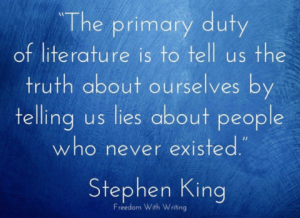When I read this article by Starr Sackstein in Education Week over coffee this morning, I was compelled to share. It was such a treat to read something more than a tweet, a meme, or a well known and oft shared quote.
I was inspired all over again by characters in The Chamber of Secrets, The Great Gatsby, The Little Prince, Pride and Prejudice, To Kill a Mockingbird – books that I love, some of which I have reread with pleasure and new insight.
But wait! Isn’t this supposed to be a blog about how best to teach English Language Learners and the strategies and resources best attuned to their instruction needs? I can hear you now, “My fourth grade ELLs can’t read Harry Potter books.” “Just try getting middle school ELLs to read F. Scott Fitzgerald, and then come back to me with your offers of wisdom.” “Forget about Jane Austen, are you nuts?”
This just makes the case stronger for reading aloud to students of all ages.
Share the gift of reading with your students. Take away the struggles and the embarrassment, the resignation and the fear. Give them characters who are facing down real life problems, or escaping pretend nightmares. Give them the chance to escape into a good story. Challenge them to connect to the characters’ struggles and accomplishments to their own lives. Imagine classroom discussions about some of these quotes from the article:
- “Here is my secret. It is very simple: It is only with the heart that one can see rightly; what is essential is invisible to the eye.”
- “It is our choices, Harry, that show what we truly are, far more than our abilities.”
- “The mark of the immature man is that he wants to die nobly for a cause, while the mark of the mature man is that he wants to live humbly for one.”
It is fair to say that most ELLs understand more English than what they can read independently. And they certainly have hearts and minds! Sure, you still need to teach vocabulary, practice comprehension strategies, and all the rest of what is entailed in teaching language and content objectives. Just don’t focus on the “hard stuff” to the point of excluding the real pleasures of reading. Read aloud should not be a filler when you have extra time or an afterthought. Write it into your schedule, include it in your lesson plans.


One Comment
Leave a reply →